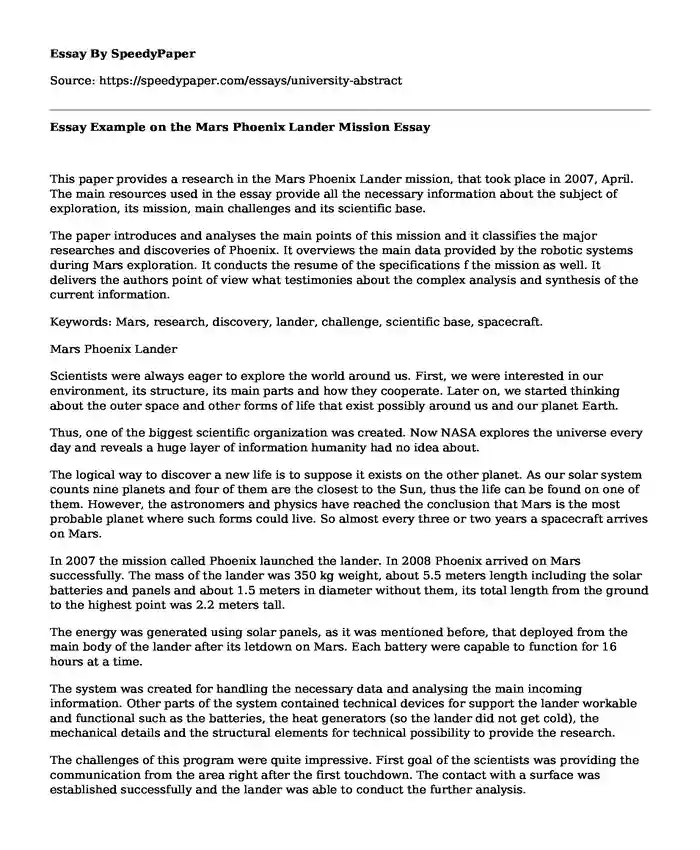This paper provides a research in the Mars Phoenix Lander mission, that took place in 2007, April. The main resources used in the essay provide all the necessary information about the subject of exploration, its mission, main challenges and its scientific base.
The paper introduces and analyses the main points of this mission and it classifies the major researches and discoveries of Phoenix. It overviews the main data provided by the robotic systems during Mars exploration. It conducts the resume of the specifications f the mission as well. It delivers the authors point of view what testimonies about the complex analysis and synthesis of the current information.
Keywords: Mars, research, discovery, lander, challenge, scientific base, spacecraft.
Mars Phoenix Lander
Scientists were always eager to explore the world around us. First, we were interested in our environment, its structure, its main parts and how they cooperate. Later on, we started thinking about the outer space and other forms of life that exist possibly around us and our planet Earth.
Thus, one of the biggest scientific organization was created. Now NASA explores the universe every day and reveals a huge layer of information humanity had no idea about.
The logical way to discover a new life is to suppose it exists on the other planet. As our solar system counts nine planets and four of them are the closest to the Sun, thus the life can be found on one of them. However, the astronomers and physics have reached the conclusion that Mars is the most probable planet where such forms could live. So almost every three or two years a spacecraft arrives on Mars.
In 2007 the mission called Phoenix launched the lander. In 2008 Phoenix arrived on Mars successfully. The mass of the lander was 350 kg weight, about 5.5 meters length including the solar batteries and panels and about 1.5 meters in diameter without them, its total length from the ground to the highest point was 2.2 meters tall.
The energy was generated using solar panels, as it was mentioned before, that deployed from the main body of the lander after its letdown on Mars. Each battery were capable to function for 16 hours at a time.
The system was created for handling the necessary data and analysing the main incoming information. Other parts of the system contained technical devices for support the lander workable and functional such as the batteries, the heat generators (so the lander did not get cold), the mechanical details and the structural elements for technical possibility to provide the research.
The challenges of this program were quite impressive. First goal of the scientists was providing the communication from the area right after the first touchdown. The contact with a surface was established successfully and the lander was able to conduct the further analysis.
The other important task the spacecraft had was finding at least some form of water. Its presence was supposedly proved before the mission itself so the aim was to identify the truth of this statement. Eventually NASA declared that Phoenix confirmed the presence of water ice on Mars. After the heating of the initial sample of water ice, as the temperature reached 0 C, the Lander system elicited the necessary results. As liquid forms cannot exist because of the low pressure on the planet, anyway Phoenix detected the water vapor.
The third challenge of the mission was providing the main data about the soil structure within the samples. As a result the robotics systems have analysed the sample and came to the conclusion that it contained unknown and unusual components in salts, and the acidity of the Martian soil.
These discoveries showed that the life on Mars is possible and it was proved scientifically without building only hypothesis and theories around this question.
If you ask me, this mission on Mars was extremely important for the whole science and the world in general. As it was mentioned above, the question of other life forms are still central among the scientists and this very mission confirms these suggestions. The photos provided by the website are detailed, informative and instructive. Considering the fact that it was impossible for me to see the preparations of the mission and the launching itself, the photos clarify the details and helps me to conduct the complete research of this mission.
References
NASA. NASA, 31 July 2015. Web. 01 July 2016.¶
Cite this page
Essay Example on the Mars Phoenix Lander Mission. (2019, Oct 07). Retrieved from https://speedypaper.net/essays/university-abstract
Request Removal
If you are the original author of this essay and no longer wish to have it published on the SpeedyPaper website, please click below to request its removal:
- Writing Inspiration in Free Essay Sample
- Students' Leadership Essay Examples
- Developmental Milestones - Free Essay on Human Development
- Essay Sample with a Book Report: Beyond My Control by Nancy Friday
- Argumentative Free Essay: No Great Mischief
- Free Essay on Environmental Studies (A Case of Silicon Valley)
- Essay Sample on Personality Questionnaires on Employee Recruitment
Popular categories





